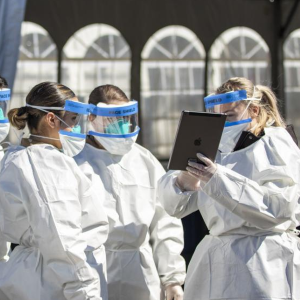
At a White House briefing March 19, President Donald Trump said, “Nobody knew there’d be a pandemic or an epidemic of this proportion.” But that’s simply not the case.
Among others, the U.S. intelligence community warned in its annual threat report for 2019 that “that the United States and the world will remain vulnerable to the next flu pandemic or large-scale outbreak of a contagious disease that could lead to massive rates of death.”
The president made his remarks at a coronavirus task force press briefing. Trump deflected the blame when asked about the lack of coronavirus tests and medical supplies to deal with the pandemic.
Trump, March 19: They had an obsolete system, and they had a system, simultaneously, that was not meant for this. It wasn’t meant for this. Nobody knew there’d be a pandemic or an epidemic of this proportion. Nobody has ever seen anything like this before.
But experts have warned for years about the danger of a major, potentially catastrophic outbreak of global disease, and some have sounded the alarm that the United States was not prepared to cope with it.
“The threat of pandemic flu is the number one health security concern,” Luciana Borio, then-director of Medical and Biodefense Preparedness Policy at the National Security Council, said at a symposium at Emory University in Atlanta in 2018 marking the 100th anniversary of the devastating flu outbreak of 1918. “Are we ready to respond? I fear the answer is no.”
Jennifer Horney, professor and founding director of the epidemiology program at the University of Delaware, told CNN, “we’ve been planning for and anticipating a global event like this” at least since the 2005 avian influenza outbreak.
After the novel coronavirus appeared in Wuhan, China, last December and spread around the world, Trump consistently sought to downplay the danger to the United States, likening coronavirus to the flu and expressing confidence that it could go away once the weather warmed up. (See our story, “Trump’s Statements About the Coronavirus.”)
Only recently has the president begun referring to it as a major problem for the U.S. “This is a pandemic,” he said at a March 17 press conference. “I’ve felt it was a pandemic long before it was called a pandemic.”
Marc Lipsitch, an epidemiology professor at Harvard University, told us that there was plenty of evidence that a disease of this kind posed a serious threat and that the notion that it could not be foreseen is off base.
“Three years ago, experts were saying that bat coronaviruses could become a new pandemic,” he said in an email. “Almost two months ago, experts were saying that the new virus in Wuhan was potentially a global threat. One month ago, experts were saying that it was likely to be pandemic, and the White House’s response was that this was under control, despite the fact that the US’s lack of testing was demonstrably giving a false picture of the extent of infection. This was foreseeable, and foreseen, weeks and months ago, and only now is the White House coming out of denial and heading straight into saying it could not have been foreseen.”
The likelihood of a pandemic has been clear to experts for quite some time.
Back in 2012, the RAND Corp. issued a report called “Threats Without Threateners? Exploring Intersections of Threats to the Global Commons and National Security.” That report focused on five risks — nuclear proliferation, conflict in the Middle East, water scarcity, pandemics and climate change.
Of the five, it said, “In current circumstances, only pandemics seem to be an existential threat, capable of destroying America’s way of life.”
The report said that “a future pandemic may be virtually certain,” adding, “its timing and severity are not.” To underscore the need to focus on the subject right away, the document said, “Pandemics are a real possibility in the here and now; there is nothing future about them.”
A week before the Trump administration took office in January 2017, Obama administration officials focused on the dangers of a pandemic in a briefing for top Trump aides, according to Politico. One of the possible scenarios sketched out included a fast-spreading global disease leading some countries to impose travel bans.
In an article in Foreign Affairs, Lisa Monaco, Obama’s homeland security adviser, wrote, “We included a pandemic scenario because I believed then, and I have warned since, that emerging infectious disease was likely to pose one of the gravest risks for the new administration.”
The U.S. intelligence community’s Worldwide Threat Assessment for 2019 also aimed a spotlight on the probability of a pandemic.
“We assess that the United States and the world will remain vulnerable to the next flu pandemic or large-scale outbreak of a contagious disease that could lead to massive rates of death and disability, severely affect the world economy, strain international resources, and increase calls on the United States for support,” the report said.
The report said it anticipated “more frequent outbreaks of infectious diseases because of rapid unplanned urbanization, prolonged humanitarian crises, human incursion into previously unsettled land, expansion of international travel and trade, and regional climate change.”
And, it warned, “though the international community has made tenuous improvements to global health security, these gains may be inadequate.”
In its assessment the year before, the intelligence community warned — presciently — that a “novel strain of a virulent microbe that is easily transmissible between humans continues to be a major threat.”
It is not possible to predict when a pandemic will occur, but Trump is wrong to say that “nobody knew” a “pandemic or an epidemic of this proportion” could happen.
The post Contrary to Trump’s Claim, A Pandemic Was Widely Expected at Some Point appeared first on FactCheck.org.

